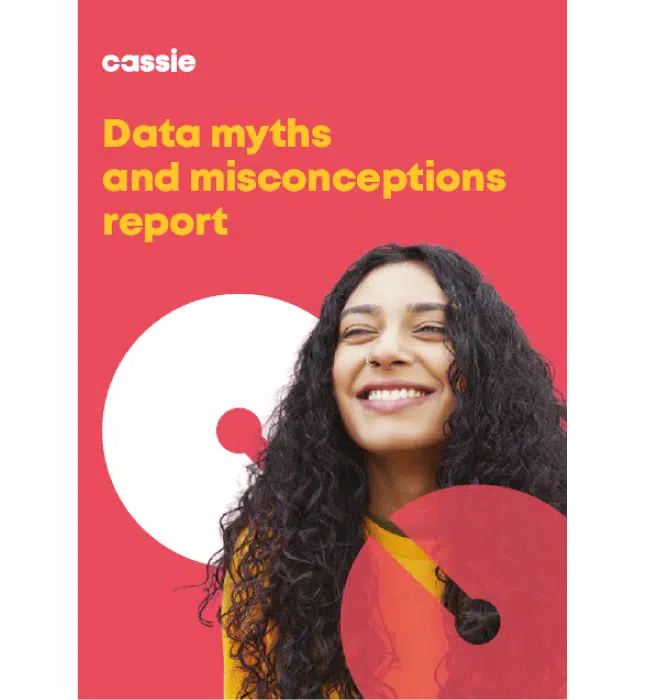Data Privacy Week 2024: Do consumers care about their data?
Posted: January 12, 2024
Every online interaction leaves a trace—a breadcrumb in the vast expanse of data that defines our digital footprint. As this footprint expands, inevitably, so does the conversation around data privacy.
In reflection of the global Digital Privacy Week, we’re asking: how much do US consumers really understand about their own data privacy?
As technology continues to evolve at a rapid pace, the subsequent data being collected at every touchpoint creates both opportunity and concern.
The lines between privacy, convenience and security are blurring.
Global regulations seek to define these boundaries, whilst the impact of technological innovations, and the ripple effects of breaches, shake consumer trust.
From the websites we visit to the products we purchase, our data tells a story—an intricate mosaic of our preferences, habits, and identities.
But who is in control of shaping this narrative, and who has access to its every chapter?
And do US consumers know or care about what happens to their data?
Our consumer research report explores the common perceptions of US citizens when it comes to data privacy, including their understanding of how companies use their data.
Let’s look at some of the results in more detail and our key findings that might impact your data privacy strategy for the year ahead…
Consumers are worried about the security of their online data
76% of respondents worry that their online data is not secure
The fact that 76% of respondents worry about the security of their online data indicates a widespread lack of confidence among users regarding the protection of their personal information. This level of concern could be attributed to various factors such as frequent data breaches, lack of transparency in data handling practices, or increasing awareness of privacy-related issues.
It also signals a significant trust deficit between users and the organizations collecting and managing their data. Addressing this concern becomes paramount to maintain user trust and confidence, as well as to comply with data protection regulations.
Sharing information about data protection measures, privacy policies, and emphasizing the steps taken to secure user data can help build trust and alleviate concerns.
The majority feel that current data protection efforts are futile
77% of respondents believe that most companies sell customer data without consent
When it comes to how consumers feel about the measures put in place by businesses to protect their data, the statistics collectively paint a concerning picture. They reflect a pervasive lack of trust and perceived inevitability of data collection without explicit consent during digital transactions.
With as many as 77% of respondents believing that most companies sell customer data without consent, this showcases a widespread perception of unethical data practices within the corporate realm. This highlights a significant disconnect between consumer expectations of data privacy and their perceptions of corporate behavior.
The 87% who believe that companies collect their data regardless of whether they opt in emphasizes a prevailing sentiment of powerlessness among users, suggesting that regardless of their choices, their data is still being harvested. This indicates a fundamental erosion of trust regarding data collection practices, potentially fueled by a lack of transparency or understanding of how data is used and shared.
The sentiment shared by 78% of respondents that it’s impossible to maintain privacy while interacting with businesses online signifies a bleak outlook on the current state of data privacy.
This perception poses a challenge for businesses to bridge the gap between consumer expectations and the reality of data collection, emphasizing the urgent need for transparent data practices and efforts to empower users to regain control over their personal information in digital interactions.
Over half of US consumers don’t know how to improve their data privacy
54% believe that using “incognito”/private browsing mode and/or rejecting cookies is one of the best ways to protect their personal data
8 in 10 respondents are at least somewhat unconfident in their awareness of what information companies can access about them
These statistics reveal a concerning lack of awareness and confidence among consumers regarding effective methods to enhance their data privacy and control the information companies access.
The fact that over half of US consumers are unsure how to improve their data privacy indicates a significant knowledge gap in understanding privacy-enhancing measures. This gap in knowledge represents a challenge for data privacy professionals to educate users about practical steps they can take to safeguard their personal data effectively.
The belief held by 54% of respondents that using “incognito” mode or rejecting cookies is among the best ways to protect their data reflects a partial understanding of privacy measures, yet these methods alone may not comprehensively protect personal information – see the latest Google tracking scandal that’s been
This misconception emphasizes the need for clearer communication and education about more robust privacy practices beyond browser settings.
A staggering 8 in 10 respondents expressed a lack of confidence in their awareness of what information companies can access about them, which underscores a pervasive lack of understanding about the extent of data collection and its implications.
This lack of confidence in understanding the breadth of data accessed by companies highlights the necessity for improved transparency from organizations and concerted efforts by data privacy professionals and marketers alike to empower consumers with comprehensive knowledge about exactly what data is being collected and why.
How companies can win back consumer trust
The overwhelming majority of respondents, at 79%, express a strong desire for individual companies to assume more responsibility in handling their data.
This sentiment underscores a call for increased accountability and ethical conduct from organizations, implying that taking proactive steps towards responsible data practices can significantly impact consumer trust.
The notable 87% who would be more inclined to opt into cookies if granted easy opt-out options suggests that providing users with control over their data collection preferences could positively influence their willingness to engage in data-sharing activities.
This emphasizes the importance of empowering users with clear and accessible choices regarding their data, aligning with their preferences, and potentially encouraging more informed consent.
Similarly, the desire for a clear explanation, voiced by 76% of respondents, about with whom the company shares data, reflects a strong demand for transparency.
This signifies an opportunity for companies to build trust by being transparent about their data-sharing practices and reassuring users about how their information is managed and utilized.
The overarching call for more transparency, indicated by 75% of respondents, encompasses a broader desire for openness and clarity from companies regarding their data practices.
This suggests that a more transparent approach to data collection, storage, and usage could significantly contribute to rebuilding consumer trust by fostering a clearer understanding of how their information is handled.
Collectively, these statistics resonate a call for a balanced approach. Data Privacy Week serves as a reminder of the imperative for greater corporate responsibility, comprehensive user education, and enhanced transparency.
This combined effort can bridge the trust gap, empowering users with knowledge while urging companies to navigate data practices ethically and transparently—a crucial harmony for ensuring privacy as technology and data collection continues to evolve.

Download our ‘data myths and misconceptions’ research report
Read our research report to understand why U.S. consumers have concerns about the security of their personal data, as we cover:
- Popular data protection measures and whether or not consumers find them to be effective
- The levels of awareness regarding the amount of information that companies can collect about consumers
- If consumers are keeping up to date with data privacy laws
- How organizations can build customer trust by respecting data and being transparent with their consumers


